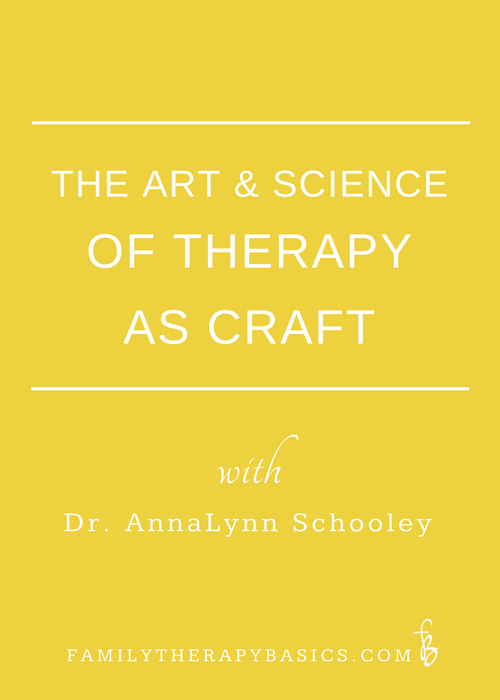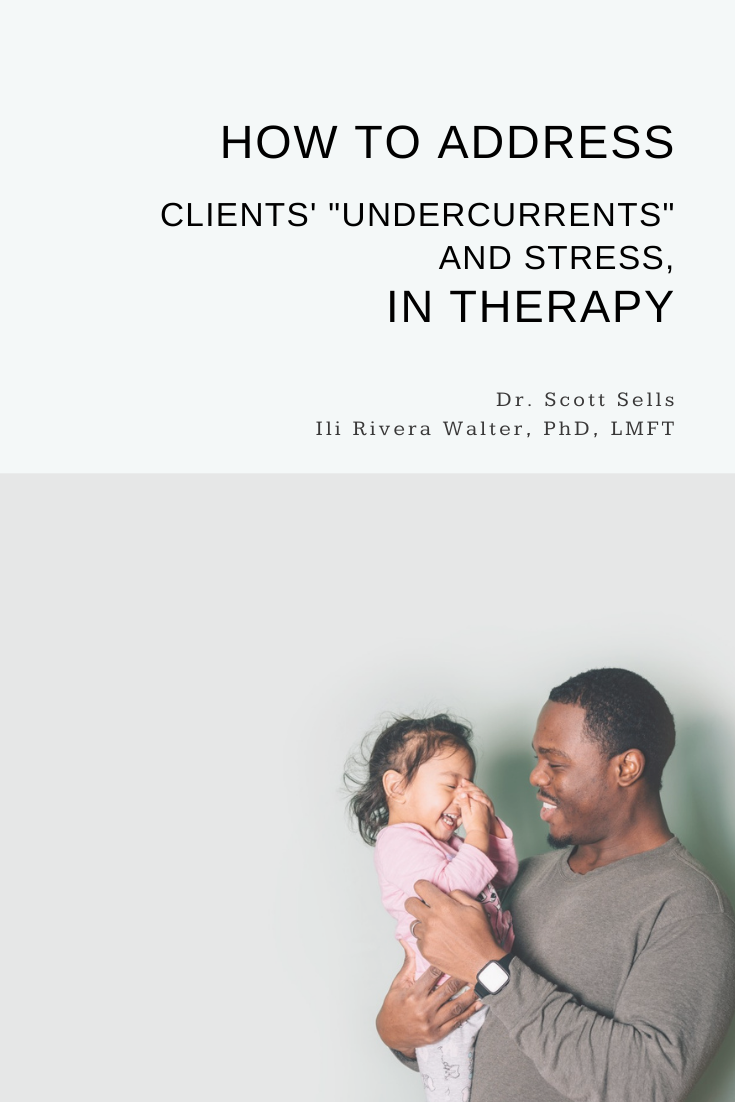Dr. Anna Lynn Schooley, professor and family therapist, joined me recently for a conversation about therapy as a craft. AnnaLynn is a professor, clinical supervisor, licensed therapist in mental health and marriage and family therapy. She identifies as a family therapist; as a result, our chat leans toward a systemic view of therapy and clients.
Recently, I have been hearing more and more that master therapists view therapy as a conversational craft. Bill Doherty mentioned it in a talk he gave in November of 2016, and Elliott Connie also emphasizes this point. I invited AnnaLynn to discuss this topic, because she is a master therapist and teacher. She has the admirable ability to observe "large" abstract concepts and explain them in detail. Here is our chat, followed by a summary of our conversation:
AnnaLynn is a guest expert in the Refreshed Therapist Network. The network is a community where therapists can learn and develop together. Learn more here.
What is your take on this idea of therapy as a linguistic skill, or the balance between art and science in the field?
Craft falls somewhere between art and science--it’s kind of a third thing. In Medieval times, there were apprentices, journeymen, and masters. You had to have a certain skill level to move from one level to another, and it was only as masters that you taught the younger generations.
The craft was experimental to see what would work and what wouldn’t; it is scientific method. What we learned from science became the craft--the things that we know work--that we then pass on to the next generation. In therapy, what we know works are the common factors.
Every therapist should master the craft of therapy, and the craft hangs out in language. All you bring as a therapist is a pen and paper, and then, yourself. There is craft to language. Linguistics is about language.
Outcomes and measures
Ili: I recently read an article from The Atlantic (What Your Therapist Doesn't Know) that suggests we as therapists should use measurements more often to understand the outcome of our work; specifically, to understand if clients' symptoms are improving.
AnnaLynn: To truly be systemic--to have a systemic perspective--you have to have both measurement and relationship. We need to understand the context in which measurements and outcomes happen.
We need to do measurement to show that what we’re doing is making a difference. Clients somehow take us more seriously if we use measurements, but how can we do it systemically? We can do it systemically by asking everyone in the family to fill out a measurement, in order to get multiple perspectives on the “depressed person" (as an example). We can use multiple measures as well as our models to find out all of the relevant information.
Do we teach therapy as a linguistic craft?
We don’t teach craft. We spend so much time teaching the content areas that the licensure laws require, that we get tons of information. We are taught way more than we end up using, unless there is someone to exhort us to use it.
Ili: Isn’t it our job to exhort ourselves?
AnnaLynn: If you know to do so. If you work at a job where someone else does the diagnosing, and you're handed the diagnosis, it's easy to accept it. Because we are busy as therapists, we may not think critically regarding the diagnosis that is handed to us. We have to slow down long enough to say, "Let me question this." This is a systemic issue.
Our hope is that it becomes systemic to be masters (i.e. master therapists).
The person who is not the natural, that has to figure it all out, then can turn it on when they want to. That's a big difference between craft--if you learn the craft, you know how to do it when the natural thing isn't happening; if you have craft, you can still make it work. As opposed to the natural, who has to have the right conditions in order to be brilliant.
“The amateur practices until they get it right; the master practices until they don’t get it wrong.”
How can we practice?
Malcolm Gladwell, in Outliers, refers to Ericsson’s research (from Florida State University): It takes 10,000 hours under a coach to become a master. It is not enough to practice; you need someone correcting you. What makes someone a master is 10,000 hours of practice with a coach.
Practice means outside of performance. The therapy session is performance. For therapists, it means practicing their skills in their everyday workings. For example. watch Law and Order (NBC television series), and listen to the questions. Identify whether they were open or closed questions. Did they invite conversation or did they shut it down? Notice the questions, as well as how people react to those questions. Do this in everyday conversations as well--with loved ones, with strangers while waiting in line, with your restaurant server, etc.
Summary
Knowing the craft of therapy means knowing when it works and when it doesn’t: When I do this, what is the outcome? To some degree, you need artistry for the craft, because the craft is enacted in the artistry (examples of graffiti artists and pickpockets). In order to be artistic and creative, you must have a set of tools and basic skills that ground the craft.
More about Dr. AnnaLynn Schooley
AnnaLynn is writing a book with Jim Hibel, in which they specify micro skills, as well as nano skills--tiny skills that make-up the micro skills of therapy practice. The book will be specific to a systems perspective, and will be available in the near future. This is the current Amazon link: Microskills for Effective Therapy and Counseling: A Systemic Perspective. The book can be the coach for therapists as they move from apprenticeship to mastery; by doing the exercises included in the book, you will reach the 10,000 hours required for mastery.
Let's Chat
What one thing stood out to you from this post?
How does the idea of mastery resonate with you?
Resources
Bill Doherty, Therapy as a Conversational Craft
Elliott Connie, Solution Focused Brief Couples Therapy Tips
The Atlantic, What Your Therapist Doesn’t Know













